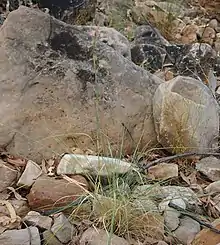Cymbopogon ambiguus
Cymbopogon ambiguus, or Australian lemon-scented grass, is a plant species in the family Poaceae.[1] It has fragrant, bluish-green grey leaves and fluffy seed heads. It is self-fertile.
| Cymbopogon ambiguus | |
|---|---|
 | |
| Scientific classification | |
| Kingdom: | Plantae |
| Clade: | Tracheophytes |
| Clade: | Angiosperms |
| Clade: | Monocots |
| Clade: | Commelinids |
| Order: | Poales |
| Family: | Poaceae |
| Subfamily: | Panicoideae |
| Genus: | Cymbopogon |
| Species: | C. ambiguus |
| Binomial name | |
| Cymbopogon ambiguus | |
Cultivation
Cymbopogon ambiguus needs a sunny position. It can tolerate extreme dryness once established. Propagation is by division of clumps or from seed. Lemongrass can be grown in any soil and needs very little water. It grows to a height of 1.8 m (5 ft 11 in).
Uses
Infusions and concoctions of Cymbopogon ambiguus have been used in traditional Aboriginal Australian medicine to treat headaches, chest infections, and muscle cramps.[1] It has also been proposed as a candidate for rhizoremediation of hydrocarbon-contaminated soils.[2]
Read also
References
- Grice, I. Darren; Rogers, Kelly L.; Griffiths, Lyn R. (2011). "Isolation of Bioactive Compounds That Relate to the Anti-Platelet Activity of Cymbopogon ambiguus". Evidence-Based Complementary and Alternative Medicine. pp. 1–8. doi:10.1093/ecam/nep213. PMC 3135635. PMID 20047890. Retrieved 2022-09-19.
- Gaskin, Sharyn E.; Bentham, Richard H. (2010-08-01). "Rhizoremediation of hydrocarbon contaminated soil using Australian native grasses". Science of the Total Environment. 408 (17): 3683–3688. Bibcode:2010ScTEn.408.3683G. doi:10.1016/j.scitotenv.2010.05.004. ISSN 0048-9697. PMID 20569970.
This article is issued from Wikipedia. The text is licensed under Creative Commons - Attribution - Sharealike. Additional terms may apply for the media files.